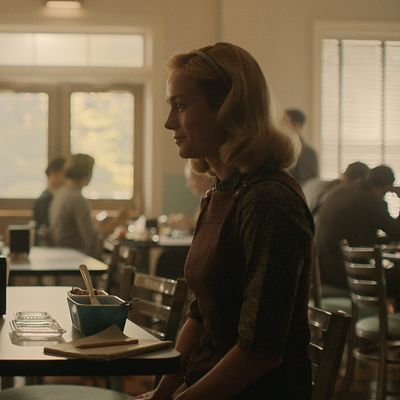
Sharpen your pencils, friends, this is Lessons in Chemistry. Surely, most of you are tuning in to this Apple TV+ miniseries because you’re a fan of the source material, Bonnie Garmus’s best-selling 2022 novel of the same name. The novel version of Lessons in Chemistry touched on some serious subject matter but always felt like a dramedy thanks to its peculiar main character and also a Very Good Dog that does his own narration (don’t worry, the series will get to him). It may have simplified some of the complex problems women faced in the 1950s and 60s, but it was completely captivating nonetheless. But hey, maybe you haven’t read the novel and are here because you’re a Brie Larson fan (she is perfectly cast), or maybe you just love chemistry — or food! I don’t know your life. It doesn’t matter. We’re all here now ready to go on this journey of love and science and feminism and motherhood and grief and the perils of public television together. As our flawed, prickly, and yet somehow still wildly endearing heroine Elizabeth Zott would say, “Let’s get started, shall we?”
The series kicks off by presenting us with two versions of Elizabeth Zott. First, she is a no-nonsense, quite put-together public-television cooking-show host with a killer French twist. She refers to salt as sodium chloride and changing up her lasagna recipe as “experimenting with a new variable,” if you want to understand her general vibe. She is the well-known and super popular host of Supper at Six, a show beloved by women all over because it finally takes womanhood, motherhood, and domesticity seriously.
But we quickly jump seven years earlier to meet a different Elizabeth Zott. She’s a harried lab tech at Hastings, and while it is immediately clear she is smarter than anyone else there, she is treated like complete garbage by the chemists (and, honestly, some of the secretaries). The stench of sexism in that place is about as unsubtle as it gets: lots of “sweethearts” and “honeys” and make me coffee and oh, would it kill you to smile more? But, of course, when the other guys aren’t looking, the chemists will pull Elizabeth aside to ask her for help with their work, which she always and easily provides. Elizabeth puts up with it for the most part because it’s 1951 and she doesn’t have much choice if she wants to stay employed in the field of chemistry, and because working at Hastings allows her to secretly do her own research after hours.
While her late-night sessions studying abiogenesis (the theory that life arose spontaneously from non-living matter, in case you’re interested) seem to have been going on without issue for a while, she quickly runs into two problems the night she breaks into famed chemist Calvin Evans’s lab in order to steal from his generous stock of ribose. First, she’s spotted by Fran Frask, the head of the secretary pool who is basically as sexist as all the chemists, and she snitches on Elizabeth to Dr. Donatti, who runs the place. Dr. Donatti calls Elizabeth into his office to put this pesky woman in her place. He doesn’t want to hear about the research she wants to submit for the prestigious Remsen Foundation Grant, as if a lab tech with only a Masters in chemistry and not a Ph.D. would ever be considered. Obviously, what he really means is that a woman would never be considered — hell, on the application form the line for your name has a “Mr.” in front of it. But he takes reminding Elizabeth of who she is at Hastings one step further: He tells her she needs to join the beauty pageant Fran is running at the office or she’ll be fired. It is humiliating.
But something else happens that night Elizabeth gets caught: She winds up on the radar of the mysterious and kind of grouchy Dr. Calvin Evans. Calvin has a reputation for being arrogant and a loner. He is what one might call a strange ranger, should one be so inclined. He has wildly sensitive allergies. He loves rowing. He willingly runs to and from Hastings each day and showers in the safety shower in the middle of his lab. He only eats saltines and nuts and he rarely speaks to anyone. The only reason he is employed at Hastings is because he’s a genius — he recently made the cover of Scientific America, thank you very much — and is consistently awarded grants from the Remsen Foundation. Now, when this guy discovers it was Elizabeth Zott who broke into his lab and stole his ribose, he finds her to chastise her and wonder aloud what the hell a secretary would need with ribose. When Elizabeth tries to explain that she is a lab tech with a Masters degree, he proceeds to call her a thief and “a fibber,” which I think is a word that maybe only Lewis Pullman and Lewis Pullman’s face can pull off in any kind of believable way.
When Calvin goes to complain to Fran about her — but no, don’t fire her, that’s too far he says, indicating to the audience that he doesn’t just have a sleeve of saltines where his heart should be — he learns that Elizabeth wasn’t lying about her job. He feels so guilty about that interaction and intrigued by both Elizabeth’s need for ribose and the fact that she’s in this beauty pageant that he can’t help but attend the event so he can talk to her again.
You can practically see the guy falling for Elizabeth in real time. She doesn’t last long on stage — hearing that one department paid their secretary to show some skin during the pageant is a bridge too far and Elizabeth walks out — but while she’s up there, she is completely and utterly herself. Calvin seems like a person so obsessed with work that he probably doesn’t notice most people, but you know he’s never met someone like Elizabeth Zott.
Unfortunately — or maybe fortunately, with how it all works out in the end — Calvin gets a whiff of Mrs. Donatti’s perfume and those sensitive allergies act up. Before he knows it, he’s barfing right at Elizabeth’s feet while she makes her way out the door. Instead of getting upset, she offers to drive the poor guy home. This interaction allows them to see each other in a different light, a not-yelling-at-each-other-for-being-obnoxious kind of light. She makes him tea and calls him out for having one fork. He asks her why she didn’t want to get her Ph.D. (she says it was “a complicated situation”) and when he hears what her talent would’ve been in the show (blanching a tomato to remove the skin), he tells her she would’ve won. He is in awe of her.
Next thing you know, they’re eating lunch together in the cafeteria. Well, Calvin is mooching off of Elizabeth’s near-perfect lunches. When these two adorable nerds discover that the other is also interested in abiogenesis, well, I’m surprised they didn’t just make out right there on the cafeteria table. They get to know each other over science and lasagna and eventually reach that point in their relationship so familiar to many of us, in which the woman has to explain to the man what sexism is. “I don’t understand. Why would anyone discriminate based on something as intellectually non-determinative as gender,” Calvin responds when Elizabeth explains why Donatti would never just allow her the resources to do her own research. Again, how are they not making out already? The matter-of-factness with which he asks this, as if he truly can’t comprehend how anyone, especially a scientist, would attempt a correlation between intelligence and gender, makes it both one of the dumbest and one of the hottest sentences ever uttered by a man.
Calvin comes up with a plan: He’ll request her as a lab tech and then she’ll be free to do her own research — even better, they can work on their research together. EVEN BETTER, when they publish their work, he’ll make sure she’s listed as lead scientist. And for a while, it is glorious. Sure, there is a little period of getting used to working side-by-side — Elizabeth likes order and predictability, Calvin needs jazz music to concentrate — but neither have been happier or more productive at work. They’re calling each other at night to share new thoughts and Elizabeth even, in a real shock to her system, burns her dinner one night because she’s distracted. Calvin reminds her that sometimes we learn the most when we make mistakes. Maybe it’s good for her to be a little distracted.
We flew too close to the sun! One morning, after Calvin has a major epiphany about their work during a run to the lab, he bursts into the room so excited he forgets to follow the one rule she asked of him — to never close the door when they’re alone in the lab. We’ve seen this happen to her before: Earlier in the episode, one of her bosses closes the supply closet door to yell at her and she has flashbacks to when she’s young, perhaps a student, and the flashes are quick but ominous. When her boss leaves, you see how shaken she is by just the memory. She has the same PTSD type of episode when Calvin closes the door. He’s so excited he doesn’t realize she’s in distress until she pushes him over and runs away. This isn’t going to work out after all. He’s left looking devastated, wondering what he did wrong.
Seven years in the future, Elizabeth Zott is pulling her finished lasagna out of the TV studio oven and she realizes it burned. The audience is stunned. This hasn’t happened before. Elizabeth gathers herself and reminds everyone watching that “sometimes, many times, things just turn out messy.” In life, there’s no real way to control all the variables — especially the ones you never even considered a remote possibility, like say, ones that are fans of jazz and nice long runs.
Lab Notes
• I’m a firm believer in meeting an adaptation where it is rather than constantly comparing it to the original material. HOWEVER, since we’re just kicking things off, I do want to note that those who’ve read the novel will notice a whole host of differences. One of the biggest and most welcome is what the series is doing with Harriet Sloane, Calvin’s neighbor, played by Aja Naomi King. Even though we only briefly meet her in this episode, she already feels more fleshed out than her novel counterpart, who was more of a nosy-neighbor archetype who did help Elizabeth on her journey. Here, she feels like a real person. She and Calvin are good friends and she is gearing up to protest the bulldozing of their predominantly Black neighborhood to make way for a new freeway. It’s a smart way to expand the novel for television.
• We also briefly meet Walter, the beleaguered producer of Supper at Six, who cares for Elizabeth while also being completely exasperated by her. Please see: Elizabeth agreeing to mention a canned soup sponsor on air … but calling it chemical-filled trash and tossing it in the garbage. Played by Kevin Sussman, he seems directly pulled out of my imagination while reading and put onto the screen. Could not be more excited by this casting.
• I’m sorry, you’re telling me that man, who rows every morning, runs miles and miles every day, and lives off of saltines and nuts is that beefed up? On what planet?? Listen, I’m not complaining, I’m just making a scientific observation. In conclusion: God bless the fantasy of television forever and ever, I love it so much.


